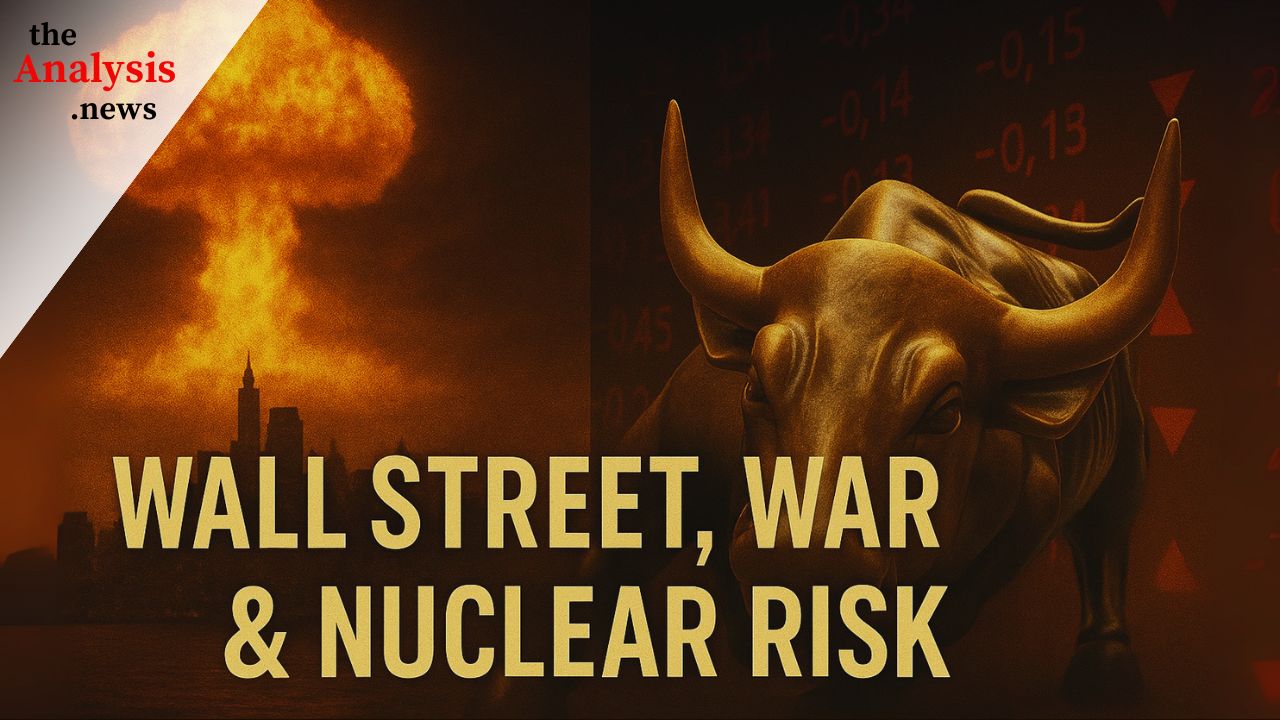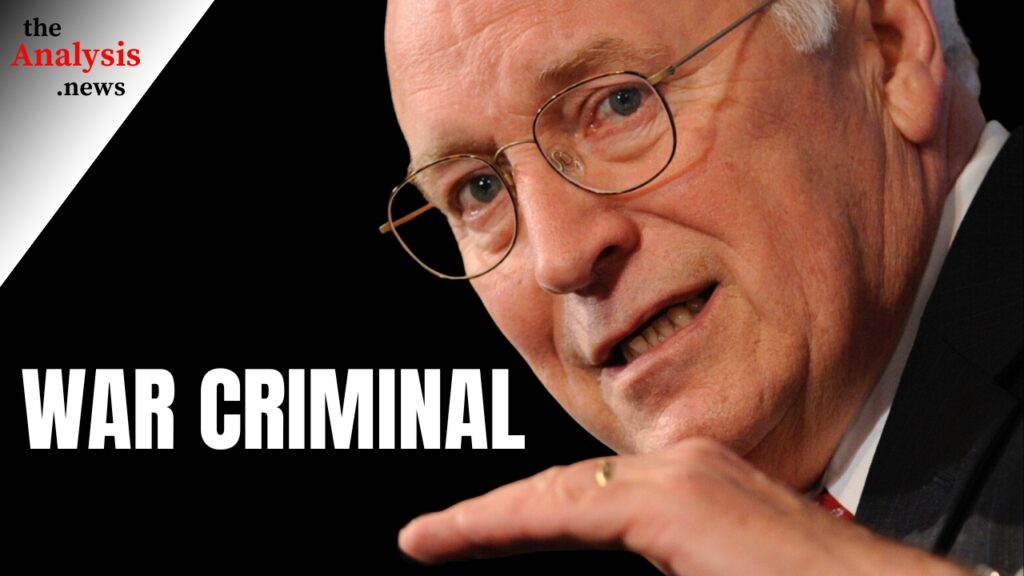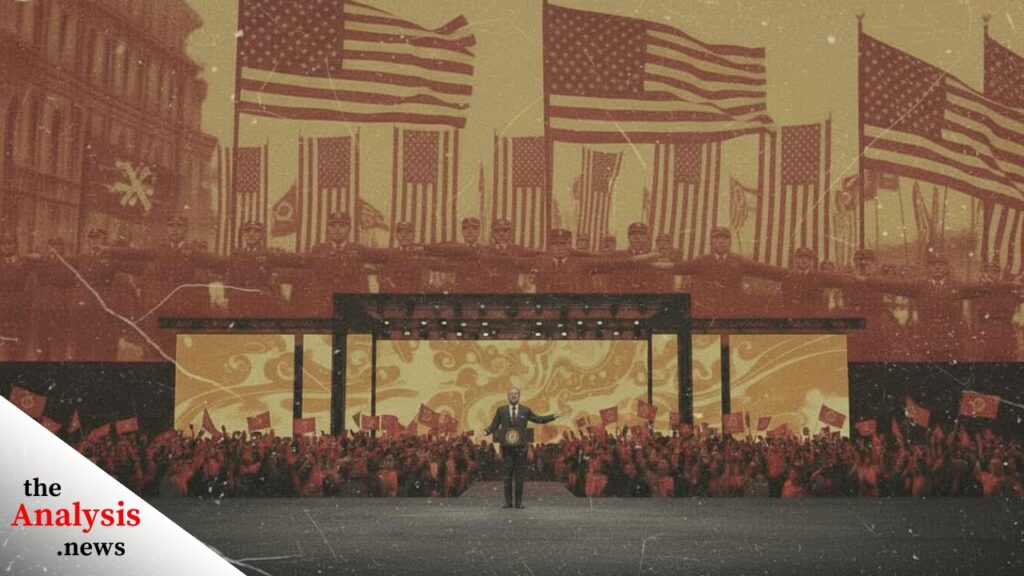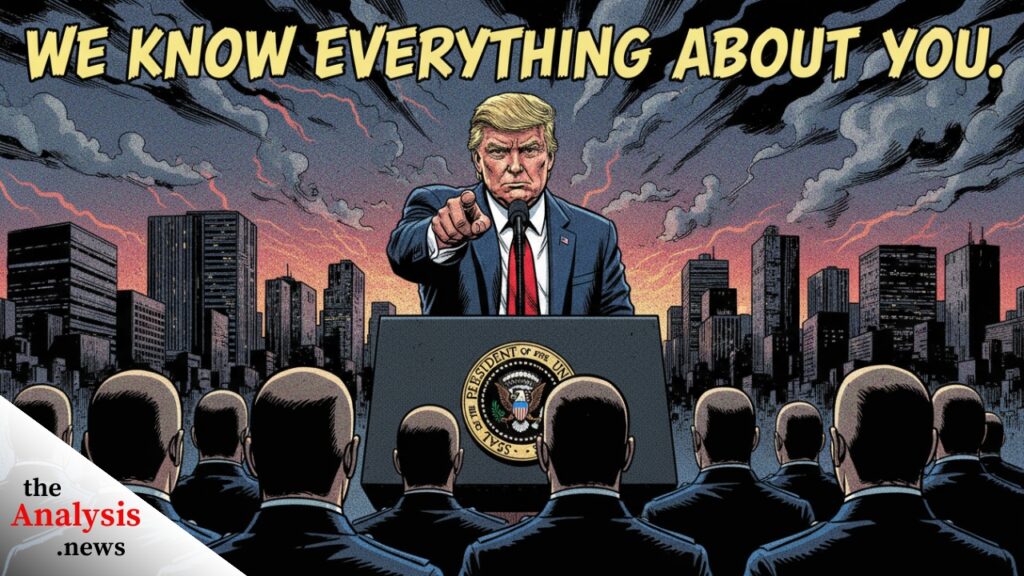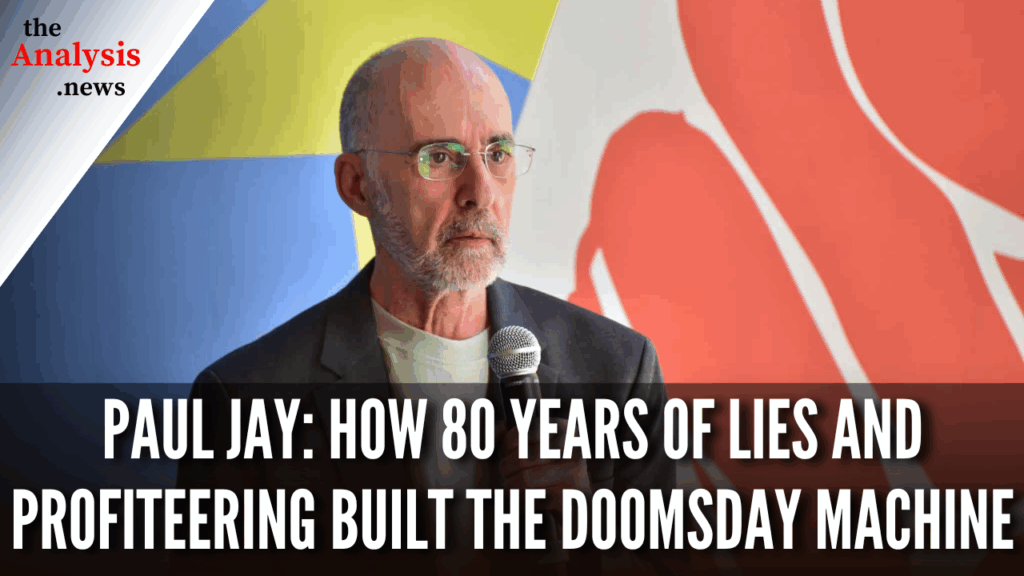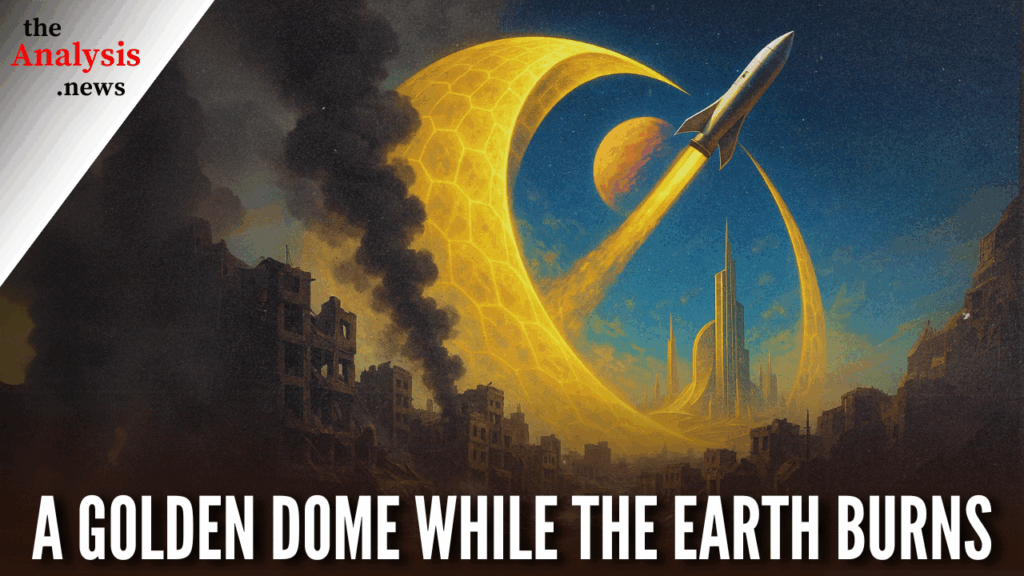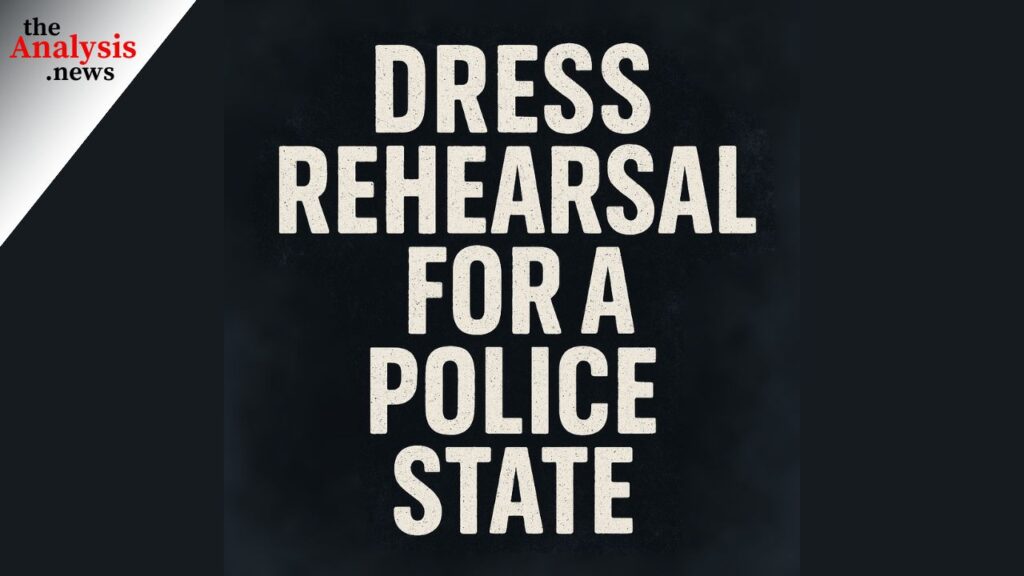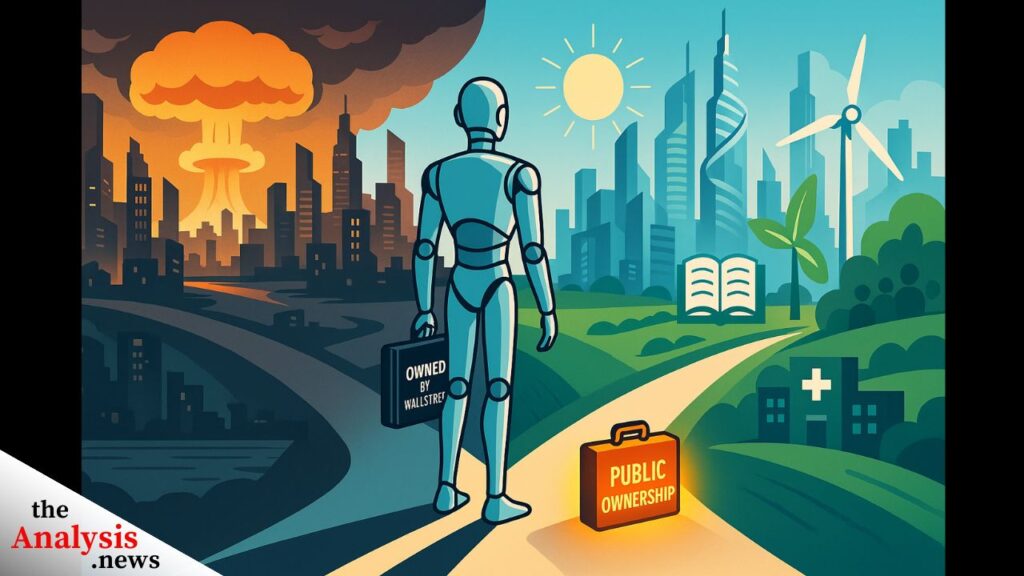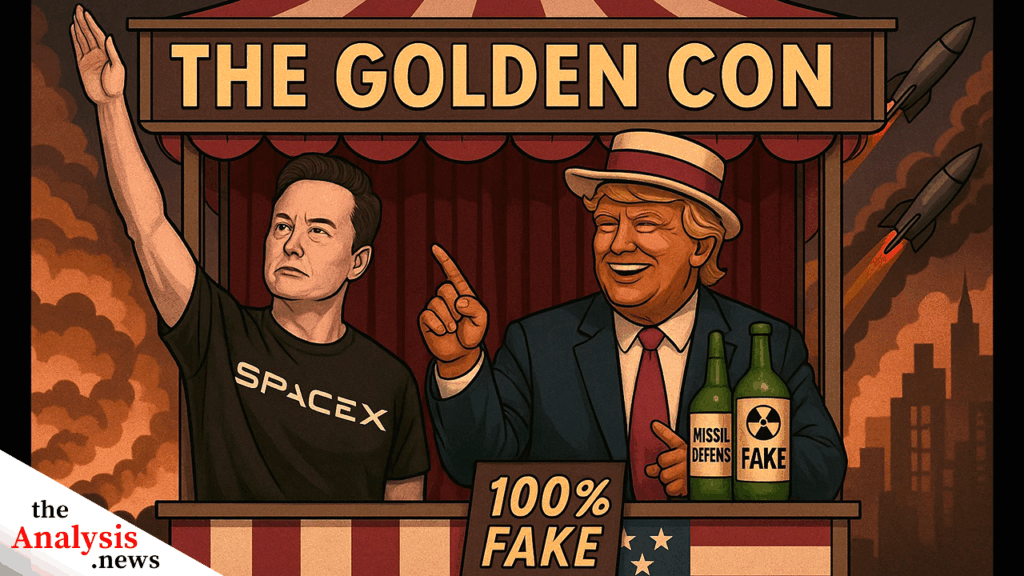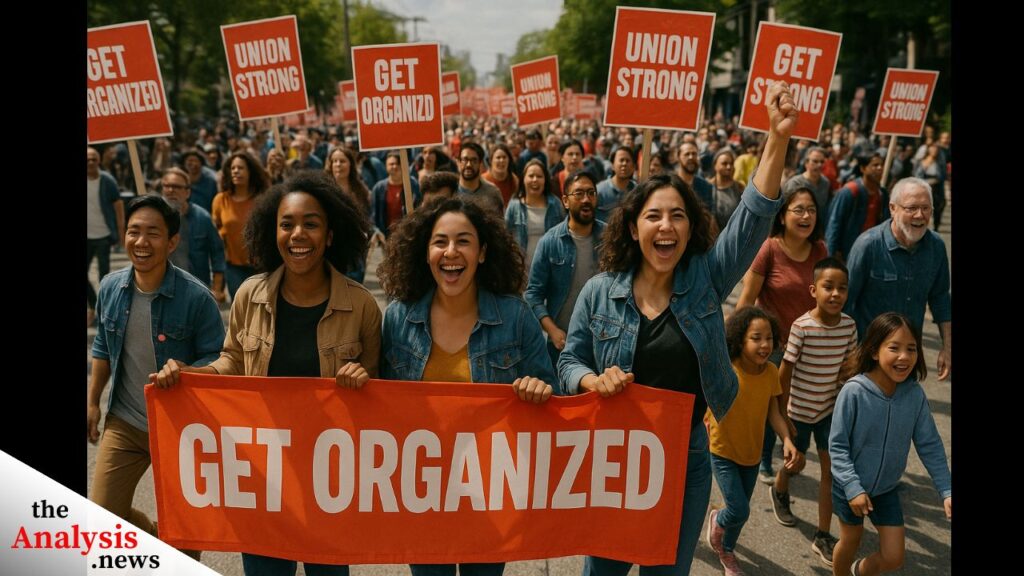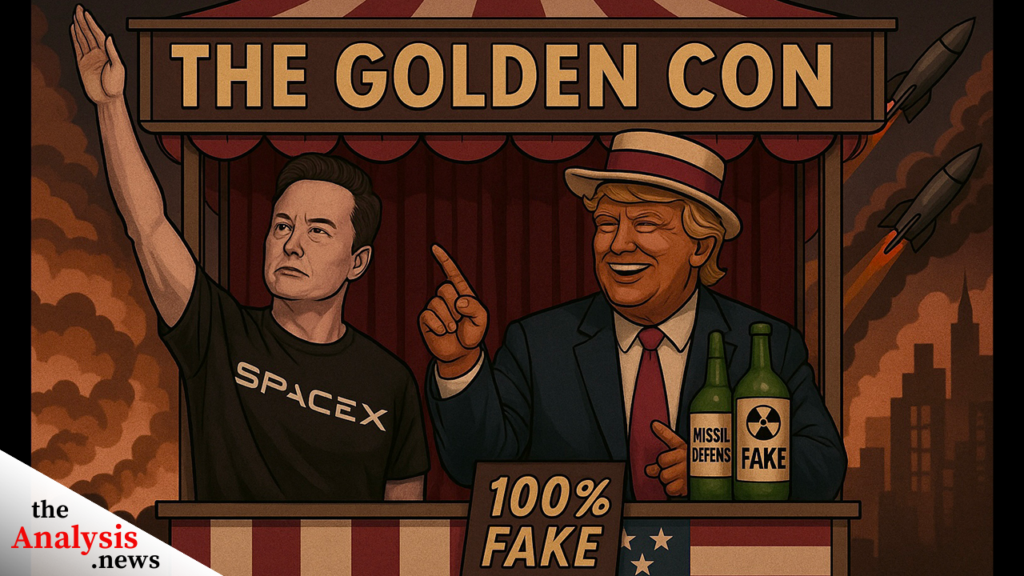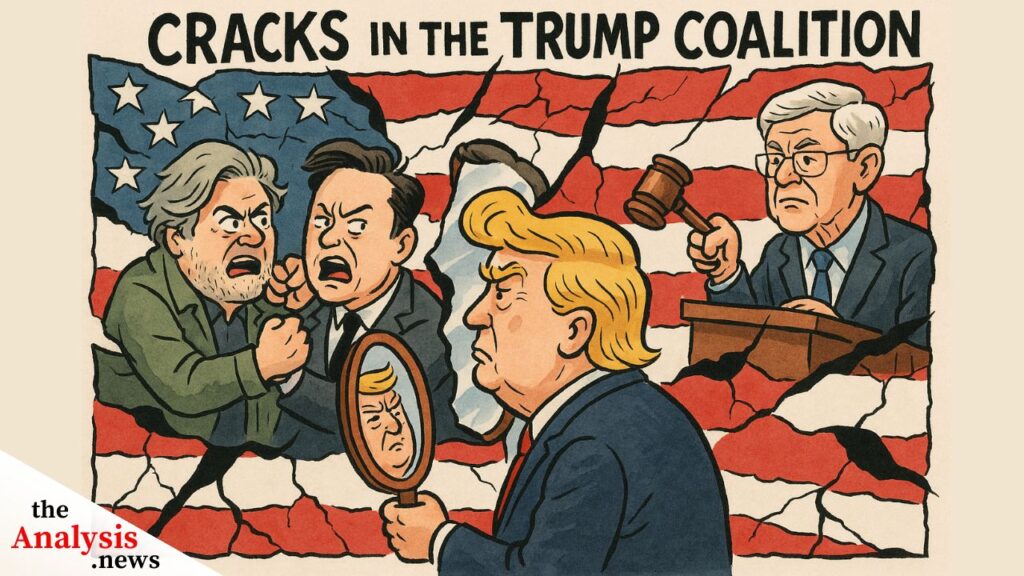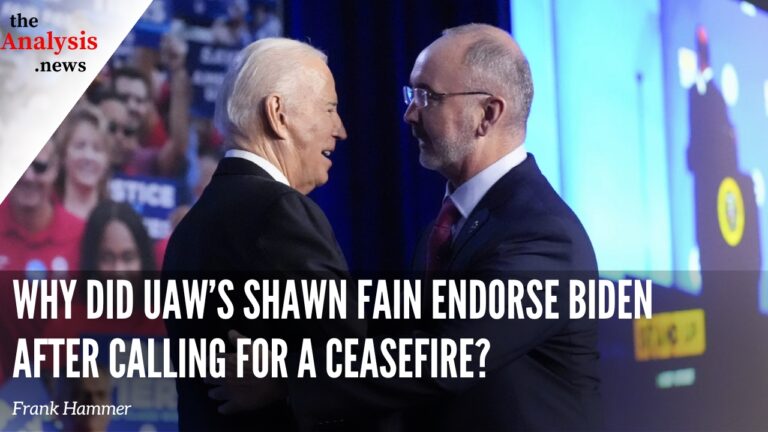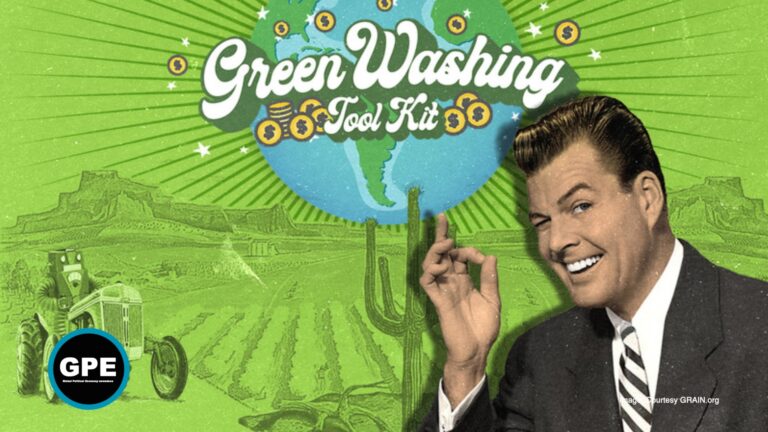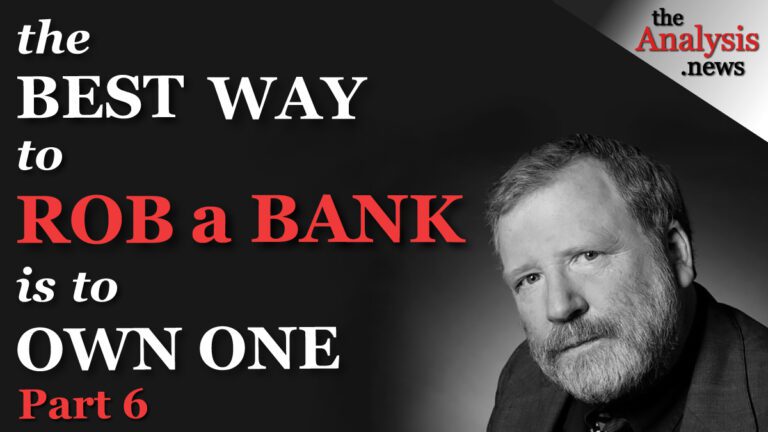Paul Jay joins Patrick Lovell to trace how Wall Street profiteering—from slavery and the Civil War to J.P. Morgan in World War I and today’s BlackRock and Vanguard—created the militarized economy driving nuclear risk.
Patrick Lovell
I am so grateful to be joined by someone I like to think of as a friend, but someone I have had the great fortune of interacting with as a result of our collective interest in work. The gentleman who is beside me is none other than Paul Jay.
I think I want to start off with just a temperature gauge because some things have happened, really, I mean, nonstop, since our last discussion, but in the past couple of weeks that dramatized really your effort over the course of the last many, many years. What is your priority at the moment? When you think of a hierarchy of things that you want to address, what is it?
Paul Jay
Well, I’m working on the film. It’s not really about Ellsberg. It’s titled How to Stop a Nuclear War, and it’s based on Dan Ellsberg’s book, Doomsday Machine: Confessions of a Nuclear War Planner. It’s not a bio of Ellsberg. He’s one of our main voices, but the film is about what it says: what are concrete measures that could be taken to reduce the risk of nuclear war? There are a few that we can talk about later, but the question is, why aren’t we?
What we pose at the beginning is something I don’t think anybody can argue with, which is the risk of nuclear war, especially accidental miscalculation and error; the risk of that causing nuclear war is far from zero. Nobody can say it’s zero. I don’t think anybody can deny it’s far from zero. So if that’s the case, then how come we’re not even talking about it, never mind doing something about it?
So that’s my main focus, but in terms of trying to answer that question, one of the important things we’re doing is unpacking the Cold War, because the Cold War assumptions, the primary assumption being, America fights for freedom, and these terrible dictatorships or autocracies are out to get us. That fundamental Cold War story has not changed. So to some extent, we’re doing the history of that and trying to get at the truth of that so we can better understand today. But we’re also, within that, is, why was there a Cold War?
Then you get to the question, which the answer is, that right from the beginning, and I mean pretty well almost day one of the United States, you had a process unfolding of the militarization of the United States. It was founded in a violent suppression of Indigenous people. It was founded in the extremely violent system of slavery. And then over time, as the Industrial Revolution developed, both of those things became more and more financialized. The banks, Wall Street started playing a critical role in both plantation culture, the cotton trade, the westward expansion, and the stealing of land from Indigenous people.
So if you want- a lot of people, when they talk about nuclear weapons and the history, they start at the Manhattan Project as if it somehow just popped up out of nowhere. And they don’t want to discuss the historical context that gave rise to the Manhattan Project.
One of the questions we want to answer is, when they knew there was no German nuclear bomb, why did they keep building the bomb? That’s probably sometime in 1943; they know that there’s no German bomb.
So, the film is going to begin with the current risk, but to understand the current situation, we’re going to go back to understand the roots of this system and class that runs this country and other countries, but we’re focusing more on the U.S., which is willing to risk the apocalypse in order to make money.
Patrick Lovell
Based on control, which I think when you first introduced the concept and the context, I was thinking about Oppenheimer, obviously, in the more recent depiction of it, of course, played by Cillian Murphy. But there was the whole virtue of his being able to go the distance at the end, where he was considered an enemy of the state because he asked those questions. Did he not?
Paul Jay
Well, I don’t think he ever asked any of the fundamental questions.
Patrick Lovell
Not the fundamental. Why did we drop the bomb? That was the question that I thought he asked.
Paul Jay
Well, not really, because he was all for it.
Patrick Lovell
Okay, well, then I bought into the Hollywood depiction of it.
Paul Jay
Even in the Hollywood depiction, the truth was even more. Oppenheimer was very much in favor of showing the world the bomb worked. He may have believed in this cockamamie idea that if you showed it work, it would be so horrible no one would ever want to use it again. But he was for it. He was actually in on picking the targets. Leo Szilard, who was one of the scientists based in Chicago, was a very important part of the Manhattan Project. He and some others circulated a petition that was supposed to go to Truman, not to drop the bomb on people. That if you have to prove the bomb works, do it on some deserted island. Oppenheimer did not sign the petition. In fact, he didn’t even show it to… He gave it to Groves, and Groves never gave it to Truman. So no, Oppenheimer is not a… He comes off as a somewhat conflicted person in the film Oppenheimer, and I guess he was because he used to be a lefty.
Patrick Lovell
Now, I was also going to say thank you for the clarification, because as you were rolling through that, I’m remembering all of the nuances, and I’m like, oh, okay, I could see where that went, because you’re very accurate in what you just responded to it.
Paul Jay
Later, he took a better position. When it came to the hydrogen bomb, he came out against the hydrogen bomb. That was good because the hydrogen bomb is the thing that puts all of human civilization at risk. It was more of a debate, more of an open debate, whether to develop the hydrogen bomb. It wasn’t done as much in secret as the Manhattan Project was. Although it’s far less secret than people claim it was, which we can talk about. But once he came out against the hydrogen bomb, and this isn’t what’s clear in the film, and it should have been, this is why he was ostracized and sidelined because of his opposition to the hydrogen bomb, and he basically was marginalized after that.
Patrick Lovell
Paul, I didn’t realize that you had also, I think, co-directed, helped facilitate, or developed Hot Docs. We were, my team, after we made our sizzle, I had the great fortune to go to Toronto, visit, and be a part of Hot Docs, which was an absolutely amazing experience. What an event. I think one of the greatest documentary film festivals that exists in the world. It absolutely blew my mind.
Now, I’ve been following you for years, and I think nobody has done better coverage than what exists on 9/11 and the families of 9/11. What you’ve done regarding Bob Graham, the 9/11 Commission, and all of the other elements that you brought to the table for years.
It’s 2025, and of course, on Thursday, there was an incredible revelation, not a revelation, but a moment that, after all of these years, there was a judge who had approved that the families could now sue Saudi Arabia. I’m curious how you responded to that when you saw that news, or if you were probably made aware of it ahead of time.
Paul Jay
No, I’m not in touch with any of the families now. I was back many years ago, but not now. Well, I’m glad the judge decided that, but the thing that hit me just recently, 60 Minutes recently, just did a piece on the 9/11 lawsuit, and they discovered a couple of boxes of FBI materials that have been sitting in a warehouse that were never turned over to the 9/11 Commission, or at least so the 9/11 Commission guy they interviewed claims, and maybe… probably true. This suggests that there’s been a cover-up of the Saudi role and so on, as if they’re discovering something.
But in the CBS piece, they never mentioned Bob Graham once, the Joint Congressional Investigation into 9/11, or the 28 redacted pages that finally mostly got unredacted, which were a complete exposure of the Saudi role. Not one mention in the CBS report… And nobody talks about Bob Graham and the Joint Congressional Committee anymore, because Graham, in his interviews with me, and as far as I know, I’m the only one where he said this on camera, but he said it several times, and it’s all out there. It’s all public.
Bob Graham
“If there was an acceptance of the fact that Saudi Arabia was essentially a co-conspirator in 9/11, how much that would change the way in which, particularly in the current milieu of events in the Middle East, Saudi Arabia is being viewed?”
Paul Jay
“It… It would change everything.”
Graham said to me, in no uncertain terms, that, number one, Bush-Cheney knew something was coming. Two, they manipulated the intelligence so that it would go to Cheney and bypass Richard Clarke, who was the anti-terrorism Tsar, and Cheney sat on it. But when I asked him, “Well, so you mean he deliberately disorganized the intelligence agencies?” And he said, “Yes, but it’s more than that. They facilitated,” which I thought was remarkable. He went that far.
Then he gave me several examples of how they actually facilitated the attacks. One being, well, everyone knows. Not everyone. People who follow this know that 30, 40, or something of members of the Bin Laden family who were in the United States were put on a plane flying back to Saudi Arabia. Even, supposedly, the skies were closed to commercial aircraft. But more than that, this is one of the things that’s most explosive, that’s completely ignored.
Now, let me just say this ahead of time. I don’t know if everything Graham says is true. I have no way to independently verify. But Bob Graham was not only the former governor of Florida, he was the co-chair of the Senate Intelligence Committee for years. This is a real insider of American intelligence. So when he’s saying this stuff, at the very least, you take it seriously. You investigate it.
Patrick Lovell
He was the co-director of the 9/11 Commission, was he not?
Paul Jay
There are two commissions.
Patrick Lovell
Okay.
Paul Jay
There’s the 9/11, the one everyone knows about. This is the one that came about under pressure from 9/11 families. Bush wasn’t going to investigate anything, but the 9/11 families were so furious about what had happened, and some of the stuff that was coming out, they insisted on having this commission. This is the one that said it was a failure of intelligence. Essentially, it was Keystone Cops, the various agencies bumping into each other, and they can’t talk to each other, and that’s why it happens.
Well, Bob Graham, using my words, says that’s all bullshit. He says that Cheney-Bush deliberately disorganized the intelligence agencies, that the intelligence was… And Thomas Drake makes this point, a former NSA guy. The intelligence bypassed Richard Clarke, went directly to Cheney. Cheney sits on it, and, for example, when the presidential briefing, Bin Laden plans to attack America. Now, this did come out. It’s on television during the coverage of the hearings. Not the Joint Congressional Committee, the 9/11 Investigative Committee, two different things. The televised one is this 9/11 Commission.
During those hearings, Condoleezza Rice is asked, “You got a memo,” from, I guess, it’s from the CIA, and it says, “Bin Laden plans to attack America. Don’t you think you do something when you get that memo? What happened?” And she says, “No, we thought it was some historical document.” I mean, total nonsense.
Anyway, Bob Graham tells me it’s way past that. The normal protocol after a presidential briefing is something called a principals briefing. It goes out within a day or two of the presidential briefing. Heads of agencies, secretaries, and undersecretaries. This is to alert people who might have to do something. You get a briefing saying Bin Laden plans to attack America, and maybe the FAA does something. Maybe the immigration Department can do something. Anyway, the next principles briefing it’s not there. Graham says to me, “Someone has to deliberately decide not to put that memo from the CIA in the principals briefing because there’s just no way it would not normally be there.” He gave that as an example, a facilitation.
Another example he gave me is the White House ordered the Immigration Department to let every Saudi person into the country, period. One guy, one immigration guy in Florida, didn’t read the memo, “Let a Saudi in,” who the Graham’s investigators believed was going to be one of the people on the planes, and actually got hell for not having read the memo. There are several other things like that if people want. It’s all up on theAnalysis website.
So the key thing here is that not only have they ignored Graham, but I myself emailed every major news organization in the country and told them what Graham had just told me on camera, and I offered them my interview footage for free. I said, “All you’ve got to do is credit me for doing the interview.” Not one answer, not one reply. I knew somebody in one of the major newsrooms. I’d worked with him, I phoned them, and I started with, “Bob Graham, serious guy, right?” “Yeah. Co-chair of the Senate Intelligence Committee.” Not co-chair, Chair of the Senate Intelligence Committee. “Not a nut, right?” “No. Serious guy.” Blah, blah, blah. So I said, “Okay, listen to what he just told me. I got it on camera, and you can have it.” He says, “Holy shit. I’ll get right back to you.” Never heard from him again.
Patrick Lovell
But there’s this incredible continuity with the media that it does not tell huge, important stories in a very systemic way, because that’s the whole reason we had to tell The Con. What I found out when we were starting to go down the pathway of The Con, just like you explored with Condoleezza Rice, and of course, all of the major players that Bob Graham said were actually demonstrably engaged with what appears to be misdirection. That’s all about asymmetric information.
For the 2008 Great Financial Crisis, there were literally thousands of high-level executives. We’ve got the story of the top-level guys who were blaring the story to the world of what was coming down the pike, and everybody ignored it. And what happens in the aftermath of the largest financial meltdown since the Great Depression? Crickets. How do you unpack that in terms of what you know? Because you’ve seen this for the last 25 years.
Paul Jay
Well, let me go back to where I was before, because I’m trying to get this story from the beginning, because everything that happens from the development of the Industrial Revolution is playing itself out today, and in some way, there’s nothing new. Well, there’s one big thing that’s new, and that’s the digital revolution, but we’ll get there in a second. What happens in the Civil War is that the South obviously wants to maintain slavery, but you have to consider the size of the slave economy. If you take the slaves as assets and put a value on them, in something like the mid-1800s, the value of the slaves was three times the value of every factory, every railroad, and every bank. That’s the size of how much slavery meant to the U.S. economy.
And who was steering this? Well, of course, you had the plantation owner aristocracy, but the key linchpin in the whole thing was Wall Street. Wall Street was the middleman for selling cotton to England. By the way, the cotton from the slave plantations was what drove the Industrial Revolution in England. So this was such a major economic force. People don’t get the scale of it.
So, while Wall Street was in the pre-Industrial Revolution period, completely wrapped up in slave culture. As the industrial revolution developed, they saw there was more money to be made out of wage slavery, industrial labor, and pushing West. So now you start getting this conflict in the elites with Wall Street completely leading the charge here. And J. P. Morgan becomes the guy.
They could live with slavery. It’s not like they were so… There was a real abolitionist movement, but the bankers, and even Lincoln for some time, could have worked it out and left a certain part of the country as slavery if Wall Street and Northern commercial mercantile money could dominate. Number two, it would be the industrial capital that would open up the West because they wanted railroads, they wanted land for settlers, because settlers mean towns, and towns mean farms. You get to loan money to farms for agriculture. You loan money to build railroads. You loan money to build towns. And eventually, you get the railroads to the West Coast, and you control sending cotton to China and to Asia.
So the westward expansion was one of them, maybe even the reason, but one of the main reasons for the Civil War. The South, of course, wanted the West because guess what? You can only use the same land for so long for cotton, and otherwise, the soil won’t grow cotton anymore. So they wanted to move west because they needed to move the plantations west.
Also, the number of African slaves was getting so big that in certain areas of the South, it was three to one, Black slaves versus Whites. So at some point, you may not be able to control these people.
So, anyway, you can get more into it, but the point I’m getting at is when we look at these things, it’s these objective economic, even geographical factors that have to be looked at. But here’s the point, and there’s lots more you could say. Who finances the Union Army? The banks, J. P. Morgan. They get the deal with Lincoln. They’re going to float bonds. They’re going to make money selling bonds. They’re going to make money buying bonds and earning interest. They got all their money back, and it goes on from there. You start the financialization of war, the discovery of, wow, war profiteering is really good. They discover that in the Civil War. Maybe it wasn’t in the beginning, but as they got into it-
And get this one. In the midst of the Civil War, J. P. Morgan owns a company that buys several thousand old crappy rifles from the Union Army for around two bucks a piece, and then the company does minor fix-ups on the rifles and sells them back to the Union Army for something like 22 bucks a rifle. This shit goes wrapped back right to the beginnings. So the process of financialization of the economy, in other words, the big banks controlling, and number two, militarization. They go hand in hand.
So you can trace this up into the First World War. This is something most people have never heard of. I only heard of it recently. In 1934, something called the Nye Committee was a Congressional committee, a guy named Senator Nye from North Dakota, and they were trying to answer the question, “Why did the United States join World War I?” And their official findings, it’s in the record, it’s in their document, in their final statements, the principal reason was lobbying by the arms industry. But even more important, because Wilson had run in the election against joining the war, J. P. Morgan had big loans out to England and France. He wanted to make sure those loans got repaid, and he pushed Wilson to go to war to make sure his loans got repaid.
Now, this is not some weird theory. This is the actual finding of the Senate Committee led by Nye. Now, that committee’s findings got buried. It was news for a while, and then the whole thing went away. Let me take one more step. This is all stuff that’s going to be in the film, but this next one, hardly anyone’s heard of.
So one of the, obviously, big families that emerges from this whole process is the Rockefellers. Standard oil, obviously, is the fuel, literally, of the Industrial Revolution. The Rockefellers, in 1921, created something called the Council on Foreign Relations. Well, in 1939, Rockefeller founded their Council on Foreign Relations and made a deal with FDR and the State Department to plan the world. How is this world going to look when the war is over? This all sounds like conspiracy stuff, except it’s all documented. This is in the CFR documents. Somebody wants to know later, I can tell you what book it is that has the actual documents in it. I’m not saying anything that isn’t documented. So even though it sounds batshit crazy, it is, unfortunately, the real history.
So the CFR makes a deal with the State Department on behalf of the Rockefellers, and the CFR members are people like the Dulles brothers. I mean, all the major players of people who become the Truman Administration and some of the key players from FDR’s administration, they create a secret committee, secret, of a hundred academics and businessmen who are going to plan the post-World War II world. It’s interesting.
In ’40, ’41, they thought the war would end like World War I ended. In other words, Germany would still exist as a power. Japan would still be a power, and there’d be these blocs in the Great Area. There’d be four blocs. The German bloc would still have some of Europe. The Soviet bloc would be the Soviet Union with some of Europe, maybe. The Japanese bloc would have Asia and probably China. There’d be the British bloc, which would really be a junior partner to the American bloc, and Americans get everything else. But they weren’t just… This wasn’t…. What did it mean by bloc? Because all of the blocs, except for the Soviet bloc, were going to be part of the same financial architecture.
Now, as you get into 1942, ’43, CFR and others, they understand, “Oh, no, we’re actually really winning this war. There ain’t going to be a Germany and Japan when this is done. This is going to be,” Henry Luce said it, and I guess it’s ’42, “This is going to be the American century.” So what happens? Henry Wallace, the Vice President, actually makes a very important speech in ’42, where he says, “No, no, this should be the century of the common man.” It’s the complete opposite of the CFR vision of a post-World War II world dominated by U.S. banking, finance, corporate, and capital.
Anyway, I think they knew from then on they were getting rid of Wallace, which they do. Vice President Wallace was essentially got rid of in a coup in, what is it, in ’44, and they brought in Truman. Then FDR is part of this, and then FDR dies, and Truman becomes president.
Anyway, when they realized in 1942, there was going to be the atomic bomb, they now understood, “Hold on here. We’re the only ones that are going to have the bomb. This post-World War II world, this ain’t going to be a normal post-World War II. This is going to be the American century. And you know what that is? The bomb and Bretton Woods. We’re going to construct the financial architecture of the non-Soviet world. We’re going to make sure that everything is part of this American century. We’ll try to roll back. We will try to undo the Soviets, but we are not going to let socialism spread anywhere else, whatever it takes.”
And that’s the actual Council on Foreign Relations plan as it develops. They have a hundred of these people on the committee. They have all these subcommittees creating reports, and they keep handing all this stuff over to the State Department, which goes through it. And sends it as recommendations to FDR. And so the post-World War world is essentially worked out by the Rockefeller money, and this reliance on corporate lawyers and academics.
Essentially, what they plan is what happened. The thing that developed more was when they got to the end of World War II, and they looked around, they said, “Holy shit, we built out this enormous aerospace industry. What are we going to do now?” So Lockheed Martin is on the verge. It’s not Martin, it’s Lockheed at that time. Lockheed is on the verge of going bankrupt. Bell Aircraft. I mean, go through it. All the big military contractors, especially in aerospace, don’t have a market anymore because the market was all guaranteed government purchases.
So, how do we keep this going? And the answer is simple. We need a goddamn good enemy, and then we’ll be able to keep it going. So, they absolutely make up this whole fiction that the Soviet Union was planning to invade Western Europe, and the first chance it gets, it’s going to attack the United States, and now we’re off to the races.
Now we have the Cold War. Between 1946 and 1923, I think it was the number I saw, three times the amount of all the federal spending on infrastructure, highways, bridges, everything, and money transferred to states for infrastructure, three times that was spent on developing nuclear weapons. It was a boondoggle.
Patrick Lovell
Wow-
Paul Jay
We’re still living in the days of the boondoggle. Of course, the latest one will be the Iron Dome, the Iron Con, which my line is; it’s not about the dome, it’s about the Gold.
Patrick Lovell
Oh, wait a second. Collateralized debt obligations, derivatives, and all of these other things that are exactly what I’m looking at between, I’m going to call it 2016, 2020, took place during the slave trade?
Paul Jay
One of the good businesses Wall Street did with the slave trade is insuring the slaves. They made money out of selling insurance to the plantation owners.
Patrick Lovell
Right. Well, my mind also goes to the original predatory lending scenario under sharecropping, which is a very early version of what ultimately takes place and what we see transpire with predatory lending and liar’s loans.
Paul Jay
Well, the next big thing after the Industrial Revolution is the digital revolution, and it has changed a lot. It takes all these practices of Wall Street and puts them on steroids.
Patrick Lovell
Right.
Paul Jay
I once sat down with a broker who was a Wall Street guy during the 1960s. And he says, “Do you realize we used to have to do all this with a pencil and paper?”
Patrick Lovell
Right.
Paul Jay
And he said to me, “Imagine doing subprime with a pencil and paper.” You can’t do it. So the digital revolution, computers and all the rest, took everything that was already essentially there, and exploded it into a completely different scale. So financialization of the economy took off like a rocket.
Patrick Lovell
During the time of Glass-Steagall and the investigation by none other than Ferdinand Pecora that would lead to the SEC, the SEC Act, and all of those other elements. Of course, they looked at the private-public partnership through exigent lending in extreme circumstances. But in the statute itself, it says you can’t use the full faith and credit of the United States to be able to float any sort of commodities trading, let alone real estate. It says that in the statutes. How do you think it’s possible no one knows that or stopped it? I’m just curious, just based on your nuance, your intelligence, what you’ve seen, your wisdom, you’ve seen this over and over. It’s a rhetorical question, but I’m curious how you answer that.
Paul Jay
What the digital revolution did is it shifted even more power to finance. So, it’s more or less around the time of the Clinton administration, it really asserts itself, although it really takes off under Reagan. But the idea that the state, the government, was there to try to moderate the excesses of capitalism, was there to try to make sure that, especially the banks… There’s this amazing speech, not a speech, a letter FDR sends to Congress in 1938 called On Monopoly. And he says, “If one section of capital gets control of the state,” the federal government, “it will be the American definition of fascism.” That’s FDR’s words. Well, that’s been a process that’s been unfolding. As I say, with the digital revolution, Reaganism was essentially the real coming to power without any mitigation of finance and militarization.
Of course, what’s happened now, especially since ’07, ’08, because one of the products of the crash of ’07, ’08 was the emergence of the big asset management firms, BlackRock, Vanguard, and State Street, because it was so volatile, what had happened in ’07, ’08, it scared the hell out of pension funds and all kinds of sovereign wealth funds and even big multimillionaires and whatever. They didn’t want to get caught again. And when they looked at who actually was able to survive ’07, ’08 without getting creamed, it was Vanguard. And you buy the entire stock exchange, and you mitigate your risk. So even if the think tanks, you’re going to come back one way or another. So these big asset management firms become the Goliaths of Wall Street.
Well, just to get back where I was, who do you think owns most of the companies that make nuclear weapons? It’s these asset management firms. They don’t aggressively manage them. They claim to be passive, but they get to decide who the board of directors are. They vote proxies for all the people. If you give your money to Vanguard or BlackRock, your pension money or personal money, they get to vote your proxy. So they have an enormous clout in these companies. The problem, what’s happened now, is the merger of financialization and militarization. In other words, Wall Street essentially owns the arms manufacturers. That doesn’t mean they don’t have their own individual billionaires and characteristics, but underpinning it all is finance.
So let’s get back to your question. Why did these regulatory authorities’ legislation get overturned? Because finance wants it. They own Congress, and there’s a little bit of pushback occasionally, but what they’ve been undermining- So why was there a New Deal? I see your thing about a clean New Deal. Well, why was there originally a New Deal? Because FDR and a certain section of capital were smart enough to realize that if you don’t have a social safety net, if you don’t push back on the power of the banks, capitalism itself is going to be threatened. And they believed, I believe FDR believed, that you could mitigate it and let it be not such a malignant system, and it would survive.
The problem is that ain’t the way capitalism works. And eventually, when the war was over, it asserted itself, which is Wall Street and other sectors of capital. They don’t want the state telling them what to do. Even if it’s good for the system, they don’t give a shit about the system. They give a shit about their own pocketbooks. It’s Bill’s thing. Bill Black, when he would say, “Paul, it’s not about the banks. It’s about the bankers.” But that goes for the whole bloody system. It’s not just the banks. They don’t even really care about the capitalist system if they’re making off like bandits for now.
So the role of government trying to regulate has been their enemy, except for a small section of capital that understands, “Wait a sec, you do need some breaks or you’re going to get more ’07, ’08s. Well, now you’ve got Trump. Now the people who don’t want any breaks, now that the cabal is in power. So there’s going to be no breaks on banking, no breaks on the development of artificial intelligence, and no breaks on the weaponization of space. I mean, every rational force within the capitalist system has been defeated, and the fucking crazies have taken over the nut house.
Patrick Lovell
Right, which is by design, as we both know through Project 2025 and all of these diabolical billionaires that have fomented the technocrats throughout the whole time.
Paul Jay
Can I just disagree with one thing? I wouldn’t even call them diabolical. They are the natural product of a system that inevitably concentrates ownership in fewer and fewer hands and thus concentrates power in fewer and fewer hands. So diabolical sounds like somehow they’ve come up with some alchemy that’s doing this. No, no, no, no. They’re not the bastards of the system. They’re legitimate children of this system.
Patrick Lovell
Well, I agree. But like I always say, greed is a disease, right, of misery, but it’s not illegal. Control fraud is. Racketeering is. And their methodologies of deception through the falsification of business records that we saw play out in the 34 felony convictions of Trump. Guilty 34 times, which is great, but we’re good-
Paul Jay
We don’t know what’s illegal anymore because-
Patrick Lovell
Well, I know. I’m aware of that-
Paul Jay
What is illegal now?
Patrick Lovell
The problem for me has been watching this thing unravel since 9/11; no one is willing to take on the corruption. And to your point, the corruption gets worse and worse and worse. It’s that age-old adage of the frog that gives the ride across the river to the scorpion because he falls for it, he gets stung to death, and they both drown. To what end? What comes next, my man?
Paul Jay
Well, I think there’s only one way out of this. I think the days of regulation, being able to mitigate this, even though I don’t think it was ever very effective. The dispossession of most people took place even during times when there was relatively more regulation, but I think we’ve reached a stage of this system. It’s worse in the U.S.. It’s pretty bad in Russia. Anyway, it’s a global system, and the U.S. is the manager of this global system.
It’s reached a point now where the parasitism of the financial sector, so much money is involved in unproductive speculation. The financial architecture of the world, to use the analogy, is a financial nuclear bomb waiting to go off. There is so much smoke and mirrors. There is such a grab. I mean, you got a president who, after getting elected, starts issuing his own Bitcoin and Bibles. I mean, it’s like the vulgarity of the con is so apparent, and it seems to make little difference for half of the population for some reason. I think that’s going to change because I think-
Patrick Lovell
And they’re the ones suffering the most.
Paul Jay
Yeah. So I think there’s only one way out. You cannot try to… I mean, I’m happy if some sect people want to fight for regulation and do this and do that. It’s not going to change much. The only thing that’s going to change much is some form of public ownership that’s democratic, and it has to start in banking, whether it’s at the level of cities or states. It’s pretty hard to do anything nationally, but in states, the North Dakota Public Bank has some merit. One can look at other examples of co-ops and whatever. You’ve got to wean certainly governments off Wall Street as much as possible. It’s, again, not easy because sometimes these financial flows are very big. But some of the big states have the capacity for it, California, Illinois, and New York. Maybe what’s happening with Trump now, he’s going to push these states further into rethinking just what kind of world we are living in here.
But public ownership, one, of banking, with democratic forms of control. We absolutely have to demand public ownership of artificial intelligence, or we’re fucked, excuse the language. AI in the hands of for-profit Silicon Valley does only two things: militarize and become even more of a surveillance state. That is going to lead us to doom, not the least of which is not only are the leaders of AI are telling us that AI, sooner than later, is going to become kind of autonomous in a way. Even some of the people like Schmidt and others, leading minds of AI, are actually talking about how AI could decide at some point, the best way to carry out its mission is without humans.
So just on itself, it’s an issue. And I’m very pro-AI. I really do believe publicly-owned AI is part of the solution because now we can have a decentralized planned economy that never could have existed before, but only if it’s publicly owned and democratically controlled. At any rate, you need public banking, you need public AI, and you have to have a real mass movement. We have to wake people up because the threat is so existential. And it’s not just about nuclear weapons.
Imagine the world at three degrees warming, four degrees warming. We may see… Two degrees, apparently, according to Hansen, a lot of credible people, is already baked in. We’re already heading to two, maybe within less than 10 years. By 2050, we could easily be at 3, and some people even say north of three. Imagine that world and what it means in terms of the potential for war. Indian and Pakistan, out of water. Most of the agriculture of the midwestern United States. Goodbye. Most of the peoples of the south of the equator has to start trying to move north. Massive migration. So, within that context, now take the American-China rivalry. In the context, at three and four degrees, something like half of China becomes unlivable. They lose tons of their agriculture.
The world we are heading into is not just civilizationally threatening, just on the basis of climate, but add what climate does to the potential for miscalculation, error, and causing a nuclear war. I mean, we’re heading into total bonkers land. Nobody- I can’t say nobody- almost nobody is talking about this. So you want me to take you home? Just to end with, we’ve got to get past language like corruption. Of course, it’s corruption. I mean, corruption, like I gave you that example of J. P. Morgan and the rifles. You can’t even talk about this system without corruption. It’s at the core of it. But corruption sounds like it’s solvable if you could just make these bad actors. You know, let’s catch them. Let’s put them in jail or something. That doesn’t happen.
The only thing that saves us is, one, some section of the elites wake up and realize they’re going to get wiped out. You ain’t surviving a nuclear war. I don’t care what bloody dome you think you’re going to build. You’re not even going to survive climate crisis. Go build old silos and build your $50 million under the ground bunkers. Well, you’ll die there. You should make sure you have coffins in those bunkers and places to put them because that’s where you’re going to end up. So maybe some sections of the elites wake up and realize, as FDR had a section of elites that realized, “This is going to get us, too.”
But more importantly, ordinary people like us, we need to demand these changes. We can’t vote for anybody that doesn’t have a program to mitigate the risk of nuclear war, be serious about the climate crisis, and start really focusing on certain issues like public banking at state levels, city levels, turning existing co-ops into public banks or give them more scale, weaken the power of Wall Street, unless you have a real wave, and this is not out of the question, a wave of candidates who are willing to start passing serious laws to restrict the power of Wall Street. But more importantly than that, because that’s going to be really hard, creating real national public banking. So we can say, go speculate all you want, except next time you crash, go fuck yourself because we’re not bailing you out.
Patrick Lovell
Based on what you’ve said, it seems to me like we either die completely or there’s a revolution of some sort, or if people, millions, could wake up, what is it going to take to do that?
People, thank you for tuning in. Please like, subscribe, and share. Please check out Paul Jay’s work. I can’t wait to see the documentary on Ellsberg and what that means. But boy, does it sound comprehensive. Is it going to premiere at Hot Docs, by the way?
Paul Jay
It’s coming out this early spring of 2027. We’re hoping to premiere it maybe at the Cannes Festival.
Patrick Lovell
Wow.
Paul Jay
And then open theatrically everywhere.
Patrick Lovell
Fantastic.
Paul Jay
It’s narrated by Emma Thompson.
Patrick Lovell
Really? Wow. Good for you. That came through, and I am so excited for you and everything else. Can’t wait to see it. And also, everybody, please check out Paul’s collective work. Also, check out thenewuntouchables.com. Please check out thecleannewdeal.org. And of course, you can check out the blueprint of it all at thecon.tv. It was really nice to reconnect with you, Paul. Thank you so much for your time.
Paul Jay
All right. Thanks a lot, Patrick.
Podcast: Play in new window | Download | Embed
Subscribe Apple Podcasts | Spotify | Android | iHeartRadio | Blubrry | TuneIn | Deezer | RSS
[simpay id=”15123″]
Never miss another story
Subscribe to theAnalysis.news – Newsletter
